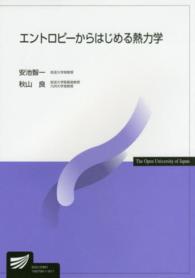- ホーム
- > 洋書
- > 英文書
- > History / World
基本説明
Providing a trans-European interdisciplinary approach, the collection focuses on three particular aspects of travel and borders: change, status and function.
Full Description
Early modern Europe was obsessed with borders and travel. It found, imagined and manufactured new borders for its travellers to cross. It celebrated and feared borders as places or states where meanings were charged and changed. In early modern Europe crossing a border could take many forms; sailing to the Americas, visiting a hospital or taking a trip through London's sewage system. Borders were places that people lived on, through and against. Some were temporary, like illness, while others claimed to be absolute, like that between the civilized world and the savage, but, as the chapters in this volume show, to cross any of them was an exciting, anxious and often a potentially dangerous act. Providing a trans-European interdisciplinary approach, the collection focuses on three particular aspects of travel and borders: change, status and function. To travel was to change, not only humans but texts, words, goods and money were all in motion at this time, having a profound influence on cultures, societies and individuals within Europe and beyond. Likewise, status was not a fixed commodity and the meaning and appearance of borders varied and could simultaneously be regarded as hostile and welcoming, restrictive and opportunistic, according to one's personal viewpoint. The volume also emphasizes the fact that borders always serve multiple functions, empowering and oppressing, protecting and threatening in equal measure. By using these three concepts as measures by which to explore a variety of subjects, Borders and Travellers in Early Modern Europe provides a fascinating new perspective from which to re-assess the way in which early modern Europeans viewed themselves, their neighbours and the wider world with which they were increasingly interacting.
Contents
Contents: Introduction: borders, travel and writing, Tom Betteridge. Part I Borders: Highways, hospitals and boundary hazards, Margaret Healy; Alien desires: travellers and sexuality in early modern London, Duncan Salkeld; Rogue traders: national identity, empire and piracy 1580-1640, Claire Jowitt. Part II Europe: Life and death on the Habsburg-Ottoman frontier: Bálint Balassi's 'In Laudem Confiniorum' and other soldier-songs, Mike Pincombe; Unwanted travellers: the tightening of city borders in early modern Germany, Maria R. Boes; Translation and the migration of texts, Andrew Pettegree. Part III Travellers: 'Idiote': politics and friendship in Thomas Coryate, David J. Baker; Returning from Venice to England: Sir Henry Wotton as diplomat, pedagogue, and Italian cultural connoisseur, Melanie Ord; Sacred cannibals and golden kings: travelling the borders of the New World with Hans Staden and Walter Ralegh, Neil L. Whitehead. Afterword: Did cannibals have a Renaissance?, Andrew Hadfield; Index.






